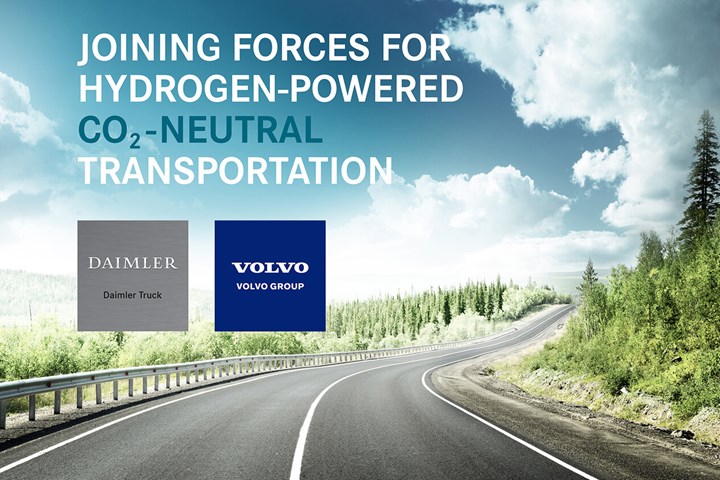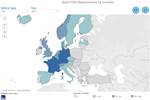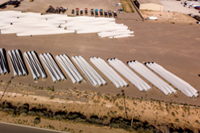Joint venture aims for large-scale fuel-cell production
The Volvo Group and Daimler Trucks AG aim to develop, produce and commercialize fuel-cell systems for primary use in heavy-duty trucks, and other applications to hit 2050 climate-neutrality goals.

Photo Credit: Volvo Group
The Volvo Group (Gothenburg, Sweden) and Daimler Truck AG (Stuttgart, Germany) signed a binding agreement on Nov. 2 for a joint venture to develop, produce and commercialize fuel-cell systems for primary use in heavy-duty trucks, and other applications. The ambition of both partners is to make the new company a leading global manufacturer of fuel cells, and thus help the world take a major step towards climate-neutral and sustainable transportation by 2050.
The Volvo Group will acquire 50% of the partnership interests in Daimler Truck Fuel Cell GmbH for approximately EUR €600 million on a cash and debt-free basis. Closing of the transaction is expected during the first half of 2021. The transaction is still subject to merger control review by relevant authorities, as well as other approvals.
“For us at Daimler Truck AG and our intended partner, the Volvo Group, the hydrogen-based fuel-cell is a key technology for enabling CO2-neutral transportation in the future. We are both fully committed to the Paris Climate Agreement for decarbonizing road transport and other areas, and to building a prosperous jointly-held company that will deliver large volumes of fuel-cell systems,” says Martin Daum, chairman of the Board of Management of Daimler Truck AG and member of the Board of Management of Daimler AG.
The joint venture will reportedly take advantage of the expertise and experience that Daimler has accumulated from its developmental work on fuel cells. It will also benefit from both company’s success as global players and build on the tradition of maximizing customer value.
“In the future, the world will be powered by a combination of battery-electric and fuel-cell electric vehicles, along with other renewable fuels to some extent. The formation of our fuel-cell joint venture is an important step in shaping a world we want to live in,” adds Martin Lundstedt, president and CEO of the Volvo Group.
The joint venture will develop a system with several power stages, including a twin system with 300-kilowatt (kW) continuous power for heavy-duty long-haul trucks. Based on the demanding conditions in heavy-duty truck applications, the joint venture’s products are also said to be ideally suited for other use cases such as stationary power generation.
The Volvo Group and Daimler Truck AG will own equal interests in the joint venture, but continue to be competitors in all other areas such as vehicle technology and fuel-cell integration in trucks.
Both companies' goal is to start with customer tests of trucks with fuel-cells in about three years and to be in series production during the second half of this decade. Closing of the transaction is expected during the first half of 2021. The transaction is still subject to merger control review by the relevant authorities, as well as other approvals.
Related Content
-
Troubleshooting thermal design of composite battery enclosures
Materials, electrical insulation and certification are all important factors to consider when optimizing electric battery performance against potential thermal runaway.
-
Materials & Processes: Composites fibers and resins
Compared to legacy materials like steel, aluminum, iron and titanium, composites are still coming of age, and only just now are being better understood by design and manufacturing engineers. However, composites’ physical properties — combined with unbeatable light weight — make them undeniably attractive.
-
ASCEND program update: Designing next-gen, high-rate auto and aerospace composites
GKN Aerospace, McLaren Automotive and U.K.-based partners share goals and progress aiming at high-rate, Industry 4.0-enabled, sustainable materials and processes.
















